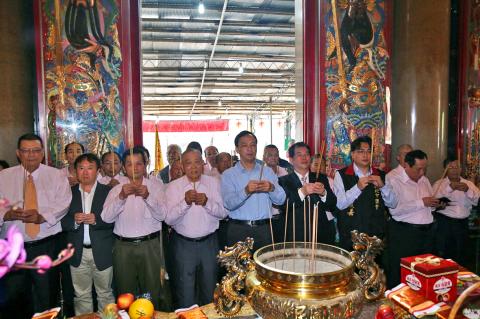Chinese Nationalist Party (KMT) legislators have initiated a petition to urge party chairman Eric Chu (朱立倫) to run for president, while Deputy Legislative Speaker Hung Hsiu-chu (洪秀柱) said the party would be “left to die” if no one comes forward soon to announce their intention to run next year.
A day after it was revealed that former interior minister Lee Hong-yuan (李鴻源) might wade into the impasse, KMT lawmakers petitioned Chu to throw down the gauntlet to the Democratic Progressive Party’s (DPP) candidate, DPP Chairperson Tsai Ing-wen (蔡英文).
At the KMT caucus meeting yesterday, KMT Legislator Wu Yu-sheng (吳育昇) was busy circulating a petition in the meeting room to collect attendees’ signatures.

Photo: Lin Yu-shan, Taipei Times
“Chu is the only person in the party who could still possibly have a close fight with Tsai; he is the only option we have. It is also possible that he could fail to win in the end, but it all depends on how well the pan-blue camp can work together as a team,” Wu said.
KMT Legislator Sun Ta-chien (孫大千) said it is “Chu’s responsibility as the party chairman, not his right, to run for president [on the KMT’s ticket].”
Wu said the petition has so far received strong support, with close to 40 legislators signing. That would amount to a majority in the KMT caucus, which has 64 legislative seats in total.
“I will not make public the list of the names of those who have signed the petition,” said Wu in response to concerns by some KMT lawmakers that the petition would divide the party.
“I don’t see the meaning of this petition, which will only split the party in two and feed the media with hubbub about KMT infighting between pro-Chu and pro-[Legislative Speaker] Wang Jin-pyng (王金平) factions,” KMT Legislator Lee Hung-chun (李鴻鈞) said. “It only puts party members in a difficult position.”
KMT Legislator Lu Chia-chen (盧嘉辰), who has always been considered pro-Wang, was said to have protested to Wu at the meeting, requesting Wu also place Wang and vice president Wu Deng-yih (吳敦義) on the petition for impartiality.
Hung said on Thursday — and reiterated yesterday — that the KMT would be “left to die” if the candidacy situation remains unresolved.
“If you are afraid of [taking action], then don’t even come out [to joint the race],” Hung said yesterday when told that potential candidates might be afraid to make their moves too early.
She called on those willing to fight to stand out or be more clear on where they stand, including the party chairman.
“If Chu really doesn’t want to run, he should also expound on his decision,” she said.
Wang continued to assert that he has no such plan “for the time being,” and said he would respect the party’s nomination process, which has not yet started.
Separately yesterday, Chu reiterated his promise to see out his term as mayor until 2019.
Chu said he had positioned himself as the “general manager” of the KMT team.
“The KMT is a team of lots of good players. Whoever is willing to participate in [the presidential election] will serve the interests of the party,” Chu said.
Additional reporting by Shih Hsiu-chuan

SECURITY: As China is ‘reshaping’ Hong Kong’s population, Taiwan must raise the eligibility threshold for applications from Hong Kongers, Chiu Chui-cheng said When Hong Kong and Macau citizens apply for residency in Taiwan, it would be under a new category that includes a “national security observation period,” Mainland Affairs Council (MAC) Minister Chiu Chui-cheng (邱垂正) said yesterday. President William Lai (賴清德) on March 13 announced 17 strategies to counter China’s aggression toward Taiwan, including incorporating national security considerations into the review process for residency applications from Hong Kong and Macau citizens. The situation in Hong Kong is constantly changing, Chiu said to media yesterday on the sidelines of the Taipei Technology Run hosted by the Taipei Neihu Technology Park Development Association. With

CARROT AND STICK: While unrelenting in its military threats, China attracted nearly 40,000 Taiwanese to over 400 business events last year Nearly 40,000 Taiwanese last year joined industry events in China, such as conferences and trade fairs, supported by the Chinese government, a study showed yesterday, as Beijing ramps up a charm offensive toward Taipei alongside military pressure. China has long taken a carrot-and-stick approach to Taiwan, threatening it with the prospect of military action while reaching out to those it believes are amenable to Beijing’s point of view. Taiwanese security officials are wary of what they see as Beijing’s influence campaigns to sway public opinion after Taipei and Beijing gradually resumed travel links halted by the COVID-19 pandemic, but the scale of

A US Marine Corps regiment equipped with Naval Strike Missiles (NSM) is set to participate in the upcoming Balikatan 25 exercise in the Luzon Strait, marking the system’s first-ever deployment in the Philippines. US and Philippine officials have separately confirmed that the Navy Marine Expeditionary Ship Interdiction System (NMESIS) — the mobile launch platform for the Naval Strike Missile — would take part in the joint exercise. The missiles are being deployed to “a strategic first island chain chokepoint” in the waters between Taiwan proper and the Philippines, US-based Naval News reported. “The Luzon Strait and Bashi Channel represent a critical access

Pope Francis is be laid to rest on Saturday after lying in state for three days in St Peter’s Basilica, where the faithful are expected to flock to pay their respects to history’s first Latin American pontiff. The cardinals met yesterday in the Vatican’s synod hall to chart the next steps before a conclave begins to choose Francis’ successor, as condolences poured in from around the world. According to current norms, the conclave must begin between May 5 and 10. The cardinals set the funeral for Saturday at 10am in St Peter’s Square, to be celebrated by the dean of the College